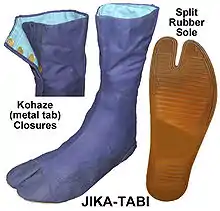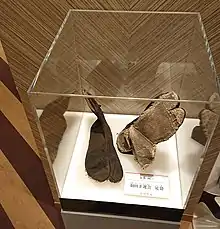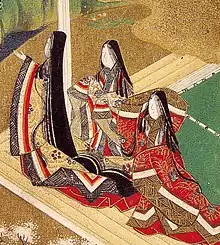Jika-tabi
Jika-tabi (地下足袋) (lit., "tabi that touch the ground") are a style of traditional Japanese footwear invented in the early 20th century. Similar to tabi socks in both appearance and construction, jika tabi have a divided toe; though they can be worn with traditional thonged footwear such as geta and zōri, jika tabi are mostly designed and made to be worn alone as outdoor footwear, resembling boots that reach roughly to the mid-calf. Jika tabi are also known as "tabi boots".

History
.jpg.webp)
.jpg.webp)
.jpg.webp)

Tokujirō Ishibashi, brother of Shōjirō Ishibashi, founder of the major tyre company Bridgestone, is credited with the invention of jika-tabi in the early 20th century.
During the 1942 Battle of Milne Bay in Papua (now part of Papua New Guinea), the Allies of World War II faced the Japanese Kaigun Tokubetsu Rikusentai (Special Naval Landing Forces), who wore jika-tabi as part of their uniform. The distinctive tread marks left by the boots allowed Allied troops (mostly Australian troops with some American units) to follow the tracks, and thus Japanese soldiers, through the muddy forests. Examples of the boots worn by Japanese soldiers are held by the Australian War Memorial.[1]
Use
Jika-tabi are known as footwear commonly used by construction workers, farmers, gardeners, rickshaw-pullers and other labourers, due to the tough material and heavy-duty but flexible rubber soles they are made from.
Though they have faced competition by the introduction of steel-toe workboots in some industries, jika tabi are still preferred by some due to the flexibility of the soles allowing the wearer a greater degree of grip than rigid-soled shoes allow. Other varieties of jika-tabi have been developed for specific labouring purposes, such as knee-high jika-tabi made entirely of rubber used by workers in rice fields and other wet and muddy environments.
In recent years, some jika-tabi manufacturers have introduced steel-toe and hard resin varieties of jika-tabi, which have been approved by the Japan Occupational Safety and Health Resource Center.
Outside Japan, jika-tabi are available from online and martial-arts shops, and are used by practitioners of the martial art of Bujinkan budo taijutsu, especially when training outdoors. Jika-tabi are also commonly worn for certain kinds of exercise, specifically cross country running, walking, and climbing.
Though typically worn for manual labour and exercise, jika-tabi are also worn for comfort and as a casual shoe. A variation of jika-tabi known as matsuri tabi is so called due to commonly being worn for festivals; this variety features extra cushioning in the sole for comfort.
Appearances in media
In recent years, jika-tabi have been seen in Hollywood movie productions. Examples include The Wolverine, 47 Ronin, Big Hero 6, Star Trek, and Thor: The Dark World. Jika-tabi have also been seen in the short movie Anima from Thom Yorke (2019).
References
- WWII Japanese 'otherworldly' jika-tabi boots on display at Australian War Memorial, Louise Maher, ABC News Online, 2017-09-26
External links
| Wikimedia Commons has media related to Jika-tabi. |
- What Are Ninja Shoes? (liveshoes.com.ua, in Russian, archived link)
